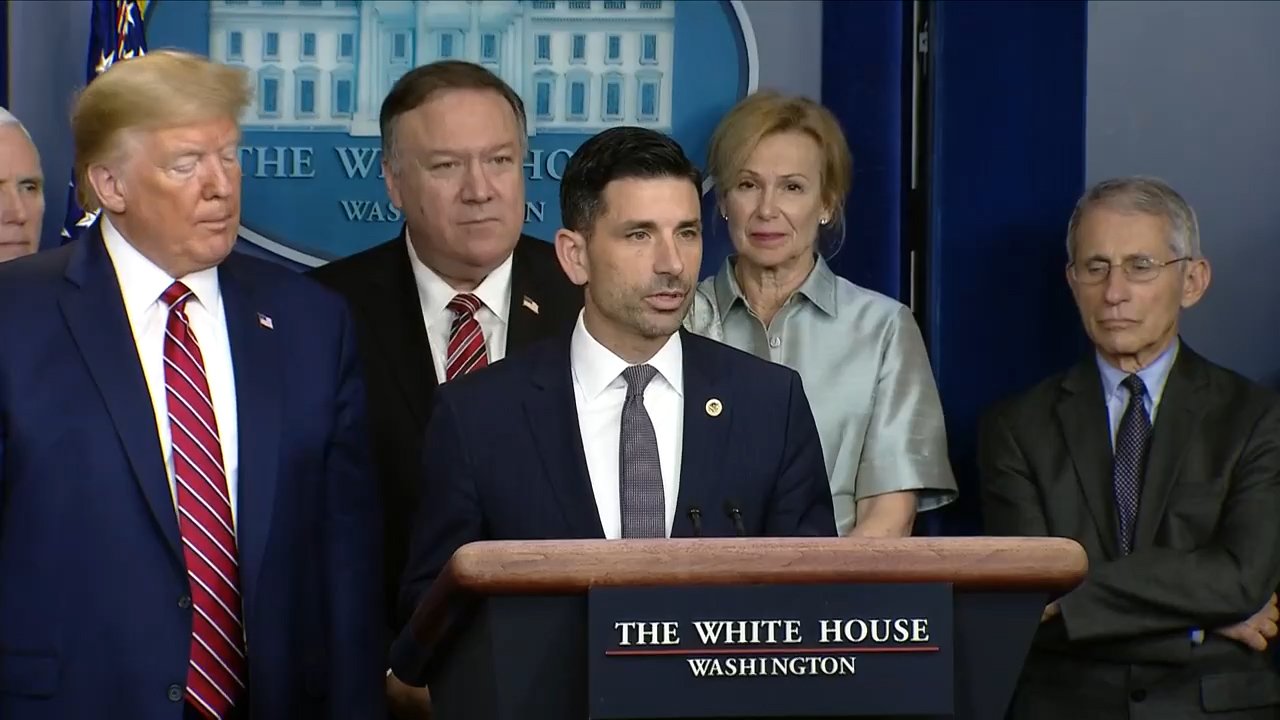
The Department of Homeland Security’s efforts across its components last week have facilitated a speedy, whole-of-government response to confronting COVID-19 and slowing the spread to keep Americans safe. FEMA is leading the way by carrying out an approach that is locally executed, state managed, and federally supported.
“Protecting both the health and national security of the American people continues to be the top priority for the Department of Homeland Security.” said Acting Secretary Chad F. Wolf. “I want to thank the men and women of the DHS workforce for their resilience as they put themselves at risk every day to protect the American people.”
Below is a list of some of DHS’s efforts against COVID-19 last week:
Federal Emergency Management Agency (FEMA)
Total Obligations to States. As of April 5th, FEMA has obligated nearly $4.1 billion in support of COVID-19 response efforts.
Project Air-Bridge. FEMA is expediting movement of critical supplies from the global market to medical distributors in various locations across the U.S. This historic partnership with the private sector is named Project Air-Bridge:
- From March 30th to April 5th, 10 flights arrived to the U.S with critical supplies.
- The cargo moved so far totals almost 83.5 million gloves, almost 5 million surgical masks, and 1.2 million gowns.
- Upon arrival, the PPE is provided, in varying quantities, first to medical distributors in areas of greatest need; then, the remainder will be infused into the broader U.S. supply chain. Prioritization is given to hospitals, health care facilities, and nursing homes around the country.
- 23 additional flights are currently scheduled through April 18.
Ventilator Distribution. FEMA is distributing ventilators to hard hit states. From March 30th to April 4th, FEMA and HHS delivered ventilators from the Strategic National Stockpile to Michigan, New Jersey, Illinois, Connecticut, and Louisiana.
Customs and Border Protection (CBP)
Keeping Critical Cargo and Trade Moving. CBP continues to process commercial cargo. Approximately $21B worth of goods crossed back and forth over the borders of U.S, Mexico, and Canada from March 30th to April 5th .
Working to Reduce Illegal Entries. CBP agents encounter nearly 4,200 migrants crossing illegally at the U.S. Southern border weekly, compared to nearly 10,000 encounters weekly prior to the current containment efforts.
Facilitating Critical PPE Deliveries. CBP lifted a Withhold Release Order that had barred importation of disposable rubber gloves which health care workers and law enforcement personnel so desperately need right now.
Immigration and Customs Enforcement (ICE)
Bringing Americans Home. Working with the Department of State, ICE continues to bring Americans home on the return leg of removal flights to Central America. As of April 5th, ICE has flown 853 U.S. citizens and legal permanent residents home on removal flights from Colombia, El Salvador, Honduras, and Nicaragua since the first flight on March 22.
Transportation Security Administration (TSA)
Keeping Air Travelers Secure. Due to the pandemic and travel restrictions, TSA continues to screen a significantly reduced number of passengers. From March 27th to April 2nd, TSA successfully screened 1,124,145 travelers ensuring individuals reached their destinations safely.
Cybersecurity and Infrastructure Security Agency (CISA)
Essential Critical Infrastructure Workers. CISA recently updated its list of essential critical infrastructure workers. As of April 5th, 20 states and territories have published Essential Business Designations.
Election Security Work Continues. CISA coordinated calls between the election community and the United States Postal Service (USPS) and Centers for Disease Control (CDC) to ensure that election officials have the most up to date information and advice from the experts at these agencies regarding COVID-19.
Helping the Private Sector Assess Risk. CISA released a guide titled Risk Management for Novel Coronavirus to assist executives in thinking through physical, supply chain, and cybersecurity issues that may arise from the spread of COVID-19.
United States Coast Guard (USCG)
Facilitating the Offload of Cruise Ships. On April 2nd, the Coast Guard facilitated the offload of more than 1,200 passengers from cruise ships Zaandam and Rotterdam in Port Everglade, FL after it was reported that crewmembers and passengers were infected with COVID-19.
U.S. Citizenship and Immigration Services (USCIS)
Making Extensions for Employment Authorization Easier. On March 30th , U.S. Citizenship and Immigration Services announced that it will reuse previously submitted biometrics in order to process valid Form I-765, Application for Employment Authorization, extension requests due to the temporary closure of Application Support Centers (ASC) to the public.
Target Date to Reopen Offices. On April 1st, USCIS announced offices temporarily suspended will begin to reopen on May 4th unless the public closures are extended further to help slow the spread of COVID-19.
Countering Weapons of Mass Destruction (CWMD)
Medical Screening at Airports. CWMD contract personnel are continuing to support CDC with enhanced screening at 13 airports. From March 29th to April 5th, CBP referred 7,565 travelers to CWMD for enhanced screening. As of April 5th, over 265,647 travelers have been referred to CWMD for screening.
Science and Technology (S&T)
Coronavirus Research. S&T’s National Biodefense Analysis and Countermeasures Center (NBACC) continued researching the impact of environmental conditions, such as temperature and humidity, to determine the virus’s survivability in the air, in respiratory fluids, and on various types of surfaces. Additional research includes decontamination methods to determine the most effective materials to clean and disinfect surfaces to rid them of the virus.
Consolidating COVID-19 Data for Government Officials. On April 1st, the NBACC updated the Master Question List (MQL), a compilation of available research and information on operationally-relevant questions.


